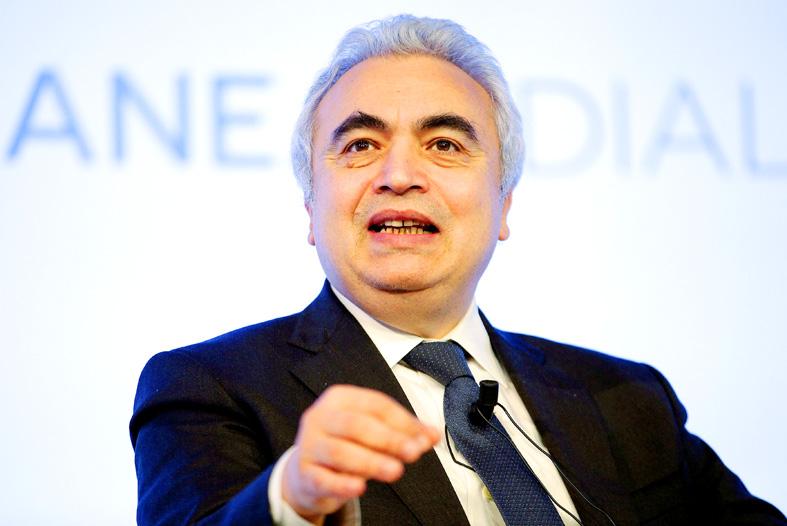The International Energy Agency (IAE) said the world could lessen an oil shortage caused by Russia’s invasion of Ukraine by restricting how people use their vehicles and accelerating the transformation of cities toward alternative means of transportation.
“We are experiencing a major crisis,” IEA executive director Fatih Birol told a news conference on Friday. “Oil markets are in an emergency situation. And not only that — it may even get worse than today in the next few months.”
The IAE said advanced economies could reduce their daily oil demand by 2.7 million barrels within four months by following a 10-step plan that would significantly ease looming supply strains by almost offsetting the loss of 3 million barrels per day from Russian production that the agency anticipates for April.

Photo: Reuters
“These efforts would reduce the price pain being felt by consumers around the world, lessen the economic damage, shrink Russia’s hydrocarbon revenues and help move oil demand to a more sustainable pathway,” the Paris-based agency said in a report.
Russian President Vladimir Putin’s invasion of Ukraine has upended global commodity markets, sending prices soaring and prompting an urgent search for alternative sources of energy.
While most states — excluding the US and UK — have not banned Russian oil imports, and none of its major customers are sanctioning natural gas supplies, there could still be disruptions as buyers voluntarily shun trade with Moscow.
The IEA’s plan to curtail oil demand includes lower speed limits for vehicles, urging people to work from home, placing occasional limits on vehicle access to city centers, making public transportation cheaper, encouraging carpooling, and greater use of high-speed rail and virtual meetings instead of air travel.
Earlier this month, the agency said the EU could slash imports of Russian gas by one-third within a year by increasing purchases from elsewhere, ramping up renewables and boosting energy efficiency.
In related news, the world’s three biggest oil field service providers are halting new projects in Russia in response to Moscow’s invasion, announcing their decisions separately within 24 hours of each other.
Baker Hughes Co on Saturday became the latest, saying in a statement that it is suspending new investment in Russia, but continuing with existing work there.
That followed a similar statement by Schlumberger NV late on Friday, when the world’s biggest oil field contractor immediately cut any new investment in one of the biggest oil-producing nations while leaving existing work there intact.
“The crisis in Ukraine is of grave concern, and we strongly support a diplomatic solution. We condemn violence and our hearts go out to the people and families of those impacted,” Baker Hughes chief executive officer Lorenzo Simonelli said in the statement.
Halliburton Co, the world’s top provider of fracking services, is the only oil field contractor to halt current and future work in Russia.
The company followed some of the largest oil explorers, including BP PLC and Shell PLC, in announcing plans to abandon Russia.

Sweeping policy changes under US Secretary of Health and Human Services Robert F. Kennedy Jr are having a chilling effect on vaccine makers as anti-vaccine rhetoric has turned into concrete changes in inoculation schedules and recommendations, investors and executives said. The administration of US President Donald Trump has in the past year upended vaccine recommendations, with the country last month ending its longstanding guidance that all children receive inoculations against flu, hepatitis A and other diseases. The unprecedented changes have led to diminished vaccine usage, hurt the investment case for some biotechs, and created a drag that would likely dent revenues and

Macronix International Co (旺宏), the world’s biggest NOR flash memory supplier, yesterday said it would spend NT$22 billion (US$699.1 million) on capacity expansion this year to increase its production of mid-to-low-density memory chips as the world’s major memorychip suppliers are phasing out the market. The company said its planned capital expenditures are about 11 times higher than the NT$1.8 billion it spent on new facilities and equipment last year. A majority of this year’s outlay would be allocated to step up capacity of multi-level cell (MLC) NAND flash memory chips, which are used in embedded multimedia cards (eMMC), a managed

CULPRITS: Factors that affected the slip included falling global crude oil prices, wait-and-see consumer attitudes due to US tariffs and a different Lunar New Year holiday schedule Taiwan’s retail sales ended a nine-year growth streak last year, slipping 0.2 percent from a year earlier as uncertainty over US tariff policies affected demand for durable goods, data released on Friday by the Ministry of Economic Affairs showed. Last year’s retail sales totaled NT$4.84 trillion (US$153.27 billion), down about NT$9.5 billion, or 0.2 percent, from 2024. Despite the decline, the figure was still the second-highest annual sales total on record. Ministry statistics department deputy head Chen Yu-fang (陳玉芳) said sales of cars, motorcycles and related products, which accounted for 17.4 percent of total retail rales last year, fell NT$68.1 billion, or

In the wake of strong global demand for AI applications, Taiwan’s export-oriented economy accelerated with the composite index of economic indicators flashing the first “red” light in December for one year, indicating the economy is in booming mode, the National Development Council (NDC) said yesterday. Moreover, the index of leading indicators, which gauges the potential state of the economy over the next six months, also moved higher in December amid growing optimism over the outlook, the NDC said. In December, the index of economic indicators rose one point from a month earlier to 38, at the lower end of the “red” light.